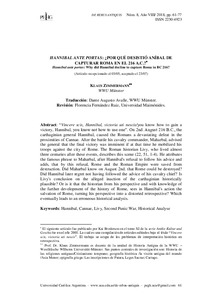Por favor, use este identificador para citar o enlazar este ítem:
https://repositorio.uca.edu.ar/handle/123456789/9165| Título: | Hannibal ante portas : ¿por qué desistió Aníbal de capturar Roma en el 216 a.C.? Hannibal ante portas : why did Hannibal decline to capture Roma in BC 216? |
Autor: | Zimmermann, Klaus | Palabras clave: | GUERRAS PUNICAS; ANALISIS HISTORICO; Livio, Tito, ca. 59 a C.-17 d C.; HISTORIA DE ROMA; LITERATURA LATINA | Fecha de publicación: | 2018 | Editorial: | Universidad Católica Argentina. Facultad de Ciencias Sociales. Departamento de Historia | Cita: | Zimmermann, K. Hannibal ante portas : ¿por qué desistió Aníbal de capturar Roma en el 216 a.C.? [en línea]. De Rebus Antiquis. 2018, 8, (8). Disponible en: https://repositorio.uca.edu.ar/handle/123456789/9165 | Resumen: | Abstract: “Vincere scis, Hannibal, victoria uti nescis/you know how to gain a victory, Hannibal, you know not how to use one”. On 2nd. August 216 B.C., the carthaginian general Hannibal, caused the Romans a devastating defeat in the proximities of Cannae. After the battle his cavalry commander, Maharbal, advised the general that the final victory was imminent if at that time he mobilized his troops against the city of Rome. The Roman historian Livy, who lived almost three centuries after these events, describes this scene (22, 51, 1-4). He attributes the famous phrase to Maharbal, after Hannibal's refusal to follow his advice and adds, that by this refusal, Rome and the Roman Empire were saved from destruction. Did Maharbal know on August 2nd. that Rome could be destroyed? Did Hannibal later regret not having followed the advice of his cavalry chief? Is Livy's conclusion on the alleged inaction of the carthaginian historically plausible? Or is it that the historian from his perspective and with knowledge of the further development of the history of Rome, sees in Hannibal's action the salvation of Rome, turning his perspective into a distorted retrospective? Which eventually leads to an erroneous historical analysis. Resumen: “Vincere scis, Hannibal, victoria uti nescis / Tu sabes vencer, Aníbal, pero no sabes como usar la victoria”. El 2 de agosto del 216 a. C., el general cartaginés Aníbal, le propinó una derrota devastadora a los romanos cerca de Cannas. Tras la batalla su jefe de caballería, Maharbal, le advirtió al general que la victoria final era inminente si en ese momento movilizaba sus tropas contra la ciudad de Roma. El historiador romano Tito Livio, que vivió casi tres siglos después de estos acontecimientos, describe esta escena (22, 51, 1-4). Èl mismo le atribuye la famosa frase a Maharbal, tras la negativa de Aníbal de seguir su consejo y agrega, que por esta negativa, Roma y el imperio romano se salvaron de la destrucción ¿Sabía Maharbal ese 2 de agosto que Roma podía ser destruída?¿Se arrepintió Aníbal posteriormente, de no haber seguido el consejo de su jefe de caballería?¿Es historicamente plausible la conclusión de Tito Livio sobre la supuesta inacción del cartaginés? ¿O es que el historiador desde su perspectiva y con conocimiento del desarrollo posterior de la historia de Roma, ve en la acción de Aníbal la salvación de Roma, convirtiendo su perspectiva en una retrospectiva distorcionada? Lo que finalmente lleva a un análisis histórico erróneo. |
Cobertura Temporal: | SIGLO II a C. | URI: | https://repositorio.uca.edu.ar/handle/123456789/9165 | ISSN: | 2250-4923 | Disciplina: | HISTORIA | Derechos: | Acceso abierto | Fuente: | De Rebus Antiquis, 8 (8), 2018 |
| Aparece en las colecciones: | DRA - 2018 nro. 8 |
Ficheros en este ítem:
| Fichero | Descripción | Tamaño | Formato | |
|---|---|---|---|---|
| hannibal-ante-portas-roma.pdf | 509,29 kB | Adobe PDF |  Visualizar/Abrir | |
| de-rebus-antiquis8.jpg | 20,96 kB | JPEG |  Visualizar/Abrir |
Visualizaciones de página(s)
1.156
comprobado en 27-feb-2026
Descarga(s)
1.401
comprobado en 27-feb-2026
Google ScholarTM
Ver en Google Scholar
Este ítem está sujeto a una Licencia Creative Commons

